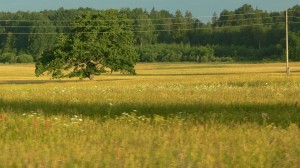Here’s a word of advice to any tourist toying with the thought of visiting Latvia. All the really great experiences you can have in this country are best enjoyed slowly.
That’s the general opinion of most people who live in Latvia, and that seems to be the consensus among international travelers, which explains why the Latvia Tourism Development Agency recently unveiled a new tourism promotion concept based around the tagline – “Latvia. Best enjoyed slowly.”
Those in the tourism industry who follow these kinds of things will know that for the last eight years Latvia was “The land that sings.” It really still is. We just won’t be talking about it so much anymore. Singing has a way of speaking for itself, and by now anyone who knows anything about Latvia knows that a lot of people sing here and many of them do it very, very well. So as long as the crystal clear waters and crisp Baltic air keep producing such expressive vocal chords, Latvia will always be the land that sings. Just ask the fans at the New York Met.

Quiet countryside like this Kurzeme meadow and forest has beguiled Latvians for centuries. In just a few weeks spring starts to blossom, you'll see why.
But we have learned some things over the last few years. Among them is the fact that most of the best and truly Latvian things you can do in Latvia, are always best enjoyed slowly, even the singing. You may enjoy dashing to London and crashing around Manhattan, and you may even want to take a run around Riga (we have a marathon every year), but once you step out into the Gauja Valley or a Kurzeme forest, life slows down to the speed of nature.
Like with any new marketing campaign, not all agree with it and some fear it may suggest that Latvians are slow. Far from it. Anyone who has driven on Latvia’s rural roads knows otherwise. That’s the odd thing about all the guys speeding to their country houses on the nation’s highways — they are in a hurry to get to a place where they can finally slow down.
It’s no secret that one of the goals of the new tourism strategy is to extend the length of time that a tourist stays in Latvia. It’s pure economics. But it’s also a win-win proposition. The longer a tourist stays in Latvia, the more he likes it. And the more a tourist likes and stays in Latvia, the more we like it. It’s not only good economics, it’s also good public relations.
In addition to all the official research, I’ve done some of my own and concluded that it takes non-Latvians a few minutes longer to understand and appreciate what Latvians already know about this country. That’s why we’re telling people not to hurry after they get here. Whether it’s a night in the sauna or a walk along the endless Liv Coast, the real magic of the experience only begins to reveal itself once you’ve stopped worrying about your next appointment.
Mobile phone coverage and Internet access is pretty widespread in Latvia, but there are places where you just want to shut everything down, turn everything off and listen to the woodpeckers. One of our biggest summer attractions is storks — we have one of the largest populations in Europe. And one of their most noble and admirable features is that they never rush anywhere. If anyone knows how to take life gracefully and slowly, it’s Latvia’s storks. But if you really want to relish the dignity of a stork, you have stop your car, get out and stay a while. They won’t mind.
You won’t see many storks in Riga however, because they prefer freshly-mown fields to four star restaurants, and their recently hatched storklettes are far too young for Rīga’s clubs and discos. The high energy LIVE RIGA! campaign is not for them, and that’s just the way it should be. Latvia has one of the great capitals of Europe, but for many, the forests, fields and water that surround it are even more intriguing. But you have to get out and walk around for a while to realize that everything you are experiencing is best enjoyed slowly.
You can’t help but stop and stare at the bizarre renderings of Riga’s Art Nouveau architects, and as the experts will tell you, the longer you look the more you see. The foxes, deer and elk won’t begin to appear until you have sat for a while in the middle of a Latgale mushroom forest. The finest herbal teas of Northern Europe only begin to reveal themselves after you’ve sipped them slowly while watching a sunset sink into the Bay of Riga.
So if you take a plane to Riga, be prepared to take some time in Latvia. Sooner or later you will begin to understand why people picked precisely this as a place to live for the last few thousand years.
Ojārs Kalniņš is the director of the Latvian Institute. The Latvian Institute (Latvijas institūts) was established by the Latvian government to provide a wide range of information about Latvia, its society, culture and history. For more information visit www.li.lv.
Disclaimer:
Views expressed in the opinion section are never those of the Baltic Reports company or the website’s editorial team as a whole, but merely those of the individual writer.












